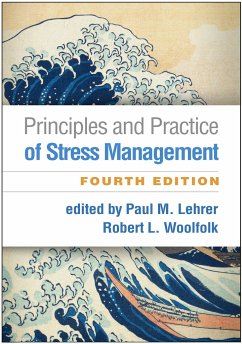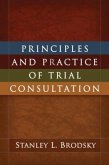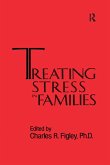Principles and Practice of Stress Management
Herausgeber: Lehrer, Paul M; Woolfolk, Robert L
Principles and Practice of Stress Management
Herausgeber: Lehrer, Paul M; Woolfolk, Robert L
- Gebundenes Buch
Andere Kunden interessierten sich auch für
![Principles and Practice of Trial Consultation Principles and Practice of Trial Consultation]() Stanley L BrodskyPrinciples and Practice of Trial Consultation57,99 €
Stanley L BrodskyPrinciples and Practice of Trial Consultation57,99 €![Treating Stress In Families......... Treating Stress In Families.........]() Charles FigleyTreating Stress In Families.........126,99 €
Charles FigleyTreating Stress In Families.........126,99 €![Thriving Under Stress Thriving Under Stress]() Thomas W BrittThriving Under Stress37,99 €
Thomas W BrittThriving Under Stress37,99 €![Relational Theory and the Practice of Psychotherapy Relational Theory and the Practice of Psychotherapy]() Paul L WachtelRelational Theory and the Practice of Psychotherapy74,99 €
Paul L WachtelRelational Theory and the Practice of Psychotherapy74,99 €![Stress, Cognition and Health Stress, Cognition and Health]() Tony CassidyStress, Cognition and Health174,99 €
Tony CassidyStress, Cognition and Health174,99 €![Stress and Health Stress and Health]() Sven SvebekStress and Health165,99 €
Sven SvebekStress and Health165,99 €![The Handbook of Stress The Handbook of Stress]() The Handbook of Stress68,99 €
The Handbook of Stress68,99 €-
-
-
Produktdetails
- Verlag: Guilford Publications
- 4th edition
- Seitenzahl: 672
- Erscheinungstermin: 1. Juni 2021
- Englisch
- Abmessung: 259mm x 191mm x 43mm
- Gewicht: 1338g
- ISBN-13: 9781462545117
- ISBN-10: 1462545114
- Artikelnr.: 59542642
Hinweis: Dieser Artikel kann nur an eine deutsche Lieferadresse ausgeliefert werden.
- Herstellerkennzeichnung
- Libri GmbH
- Europaallee 1
- 36244 Bad Hersfeld
- gpsr@libri.de
Paul M. Lehrer, PhD, BCB, is Professor Emeritus of Psychiatry at Rutgers Robert Wood Johnson Medical School. Dr. Lehrer's research interests include the mechanisms and applications of heart rate variability biofeedback; mind-body medicine; respiratory psychophysiology; and the clinical and physiological effects of relaxation therapies. His publications include 200 journal articles and book chapters. He is Associate Editor of the journal Applied Psychophysiology and Biofeedback, an Honorary Fellow of the Association for Applied Psychophysiology and Biofeedback, and a Fellow of the American Psychological Association and the Association for Behavioral and Cognitive Therapies. Dr. Lehrer is a recipient of the Lifetime Achievement Award, Outstanding Service Award, and Distinguished Scientist Award from the Association for Applied Psychophysiology and Biofeedback. Robert L. Woolfolk, PhD, is Professor of Psychology and Philosophy at Rutgers, The State University of New Jersey. He has served on the faculties of Princeton University and the University of Texas at Austin. His research interests include psychopathology and psychotherapy, the philosophical foundations of psychology, and the treatment of somatoform disorders, and he has published widely in these areas. Dr. Woolfolk has maintained an active clinical practice since the 1970s. Drawing from a variety of therapeutic approaches, he has conducted therapy with individuals, couples, families, and groups. He is a past editor of the Journal of Theoretical and Philosophical Psychology.
Foreword, Omer Van den Bergh
I. Overview of Stress and Stress Management
1. Conceptual Issues Underlying Stress Management, Robert L. Woolfolk &
Paul M. Lehrer
2. Psychophysiological and Systems Perspectives on Stress and Stress
Management, Paul M. Lehrer
3. The Psychology of Relaxation, Meditation, and Mindfulness, Jonathan C.
Smith
4. Stress, Inflammatory Cytokines, and the Brain: An Overview, Alexander W.
Kusnecov, Sara Norton, & Marialaina Nissenbaum
5. Stress and Stress Management in Children and Adolescents, Jonathan S.
Comer, Laura Nelson Darling, Cristina del Busto, Erica D. Musser, & Donna
B. Pincus
II. Stress Management Methods
- Section A. Psychophysiological Methods
6. Psychophysiological Interventions for Stress-Related, Medically
Unexplained, and Anxiety Disorders, Richard N. Gevirtz
7. Progressive Relaxation: Origins, Principles, and Clinical Applications,
F. J. McGuigan & Paul M. Lehrer
8. Eye Movement Desensitization and Reprocessing Therapy for Stress
Management, Roger Solomon, Deany Laliotis, & Francine Shapiro
9. Neurofeedback with Biofeedback for Stress Management, Michael Thompson &
Lynda Thompson
10. Biofeedback Training to Increase Heart Rate Variability, Paul M. Lehrer
11. Capnometry-Assisted Respiratory Training: Principles and Findings,
Alicia E. Meuret & Thomas Ritz
12. Whole-Body Breathing: A Systems Perspective on Respiratory Retraining,
Jan van Dixhoorn
- Section B. Meditative Methods
13. Modern Forms of Mantra Meditation for Stress Management, Patricia
Carrington & Paul M. Lehrer
14. Mindfulness Meditation for Stress Management, Jean L. Kristeller
15. Qigong Therapy for Stress Management, Kevin W. Chen
16. Yoga for Stress Management: History, Research, and Practical Details,
Shirley Telles, Niranjan Kala, Ram Kumar Gupta, & Acharya Balkrishna
- Section C. Psychotherapeutic Methods
17. Cognitive Therapy for Stress, Robert L. Leahy & Scott Woodruff
- Section D. Hypnotic Methods
18. The Autogenic Training Method of J. H. Schultz, Wolfgang Linden
19. The Treatment of Pain and Stress with Hypnosis: A Series of Emerging
Literatures, Robert A. Karlin
- Section E. Other Methods
20. Stress Concepts in Relation to Music, Töres Theorell & Ingrid
Hammarlund
21. Walk-Talk Exercise, Stress Resilience, and Mental Health, Cristy
Phillips & Wesley E. Sime
22. Wearing the Clinical Hat, Paul M. Lehrer & Robert. L. Woolfolk
Index
I. Overview of Stress and Stress Management
1. Conceptual Issues Underlying Stress Management, Robert L. Woolfolk &
Paul M. Lehrer
2. Psychophysiological and Systems Perspectives on Stress and Stress
Management, Paul M. Lehrer
3. The Psychology of Relaxation, Meditation, and Mindfulness, Jonathan C.
Smith
4. Stress, Inflammatory Cytokines, and the Brain: An Overview, Alexander W.
Kusnecov, Sara Norton, & Marialaina Nissenbaum
5. Stress and Stress Management in Children and Adolescents, Jonathan S.
Comer, Laura Nelson Darling, Cristina del Busto, Erica D. Musser, & Donna
B. Pincus
II. Stress Management Methods
- Section A. Psychophysiological Methods
6. Psychophysiological Interventions for Stress-Related, Medically
Unexplained, and Anxiety Disorders, Richard N. Gevirtz
7. Progressive Relaxation: Origins, Principles, and Clinical Applications,
F. J. McGuigan & Paul M. Lehrer
8. Eye Movement Desensitization and Reprocessing Therapy for Stress
Management, Roger Solomon, Deany Laliotis, & Francine Shapiro
9. Neurofeedback with Biofeedback for Stress Management, Michael Thompson &
Lynda Thompson
10. Biofeedback Training to Increase Heart Rate Variability, Paul M. Lehrer
11. Capnometry-Assisted Respiratory Training: Principles and Findings,
Alicia E. Meuret & Thomas Ritz
12. Whole-Body Breathing: A Systems Perspective on Respiratory Retraining,
Jan van Dixhoorn
- Section B. Meditative Methods
13. Modern Forms of Mantra Meditation for Stress Management, Patricia
Carrington & Paul M. Lehrer
14. Mindfulness Meditation for Stress Management, Jean L. Kristeller
15. Qigong Therapy for Stress Management, Kevin W. Chen
16. Yoga for Stress Management: History, Research, and Practical Details,
Shirley Telles, Niranjan Kala, Ram Kumar Gupta, & Acharya Balkrishna
- Section C. Psychotherapeutic Methods
17. Cognitive Therapy for Stress, Robert L. Leahy & Scott Woodruff
- Section D. Hypnotic Methods
18. The Autogenic Training Method of J. H. Schultz, Wolfgang Linden
19. The Treatment of Pain and Stress with Hypnosis: A Series of Emerging
Literatures, Robert A. Karlin
- Section E. Other Methods
20. Stress Concepts in Relation to Music, Töres Theorell & Ingrid
Hammarlund
21. Walk-Talk Exercise, Stress Resilience, and Mental Health, Cristy
Phillips & Wesley E. Sime
22. Wearing the Clinical Hat, Paul M. Lehrer & Robert. L. Woolfolk
Index
Foreword, Omer Van den Bergh
I. Overview of Stress and Stress Management
1. Conceptual Issues Underlying Stress Management, Robert L. Woolfolk &
Paul M. Lehrer
2. Psychophysiological and Systems Perspectives on Stress and Stress
Management, Paul M. Lehrer
3. The Psychology of Relaxation, Meditation, and Mindfulness, Jonathan C.
Smith
4. Stress, Inflammatory Cytokines, and the Brain: An Overview, Alexander W.
Kusnecov, Sara Norton, & Marialaina Nissenbaum
5. Stress and Stress Management in Children and Adolescents, Jonathan S.
Comer, Laura Nelson Darling, Cristina del Busto, Erica D. Musser, & Donna
B. Pincus
II. Stress Management Methods
- Section A. Psychophysiological Methods
6. Psychophysiological Interventions for Stress-Related, Medically
Unexplained, and Anxiety Disorders, Richard N. Gevirtz
7. Progressive Relaxation: Origins, Principles, and Clinical Applications,
F. J. McGuigan & Paul M. Lehrer
8. Eye Movement Desensitization and Reprocessing Therapy for Stress
Management, Roger Solomon, Deany Laliotis, & Francine Shapiro
9. Neurofeedback with Biofeedback for Stress Management, Michael Thompson &
Lynda Thompson
10. Biofeedback Training to Increase Heart Rate Variability, Paul M. Lehrer
11. Capnometry-Assisted Respiratory Training: Principles and Findings,
Alicia E. Meuret & Thomas Ritz
12. Whole-Body Breathing: A Systems Perspective on Respiratory Retraining,
Jan van Dixhoorn
- Section B. Meditative Methods
13. Modern Forms of Mantra Meditation for Stress Management, Patricia
Carrington & Paul M. Lehrer
14. Mindfulness Meditation for Stress Management, Jean L. Kristeller
15. Qigong Therapy for Stress Management, Kevin W. Chen
16. Yoga for Stress Management: History, Research, and Practical Details,
Shirley Telles, Niranjan Kala, Ram Kumar Gupta, & Acharya Balkrishna
- Section C. Psychotherapeutic Methods
17. Cognitive Therapy for Stress, Robert L. Leahy & Scott Woodruff
- Section D. Hypnotic Methods
18. The Autogenic Training Method of J. H. Schultz, Wolfgang Linden
19. The Treatment of Pain and Stress with Hypnosis: A Series of Emerging
Literatures, Robert A. Karlin
- Section E. Other Methods
20. Stress Concepts in Relation to Music, Töres Theorell & Ingrid
Hammarlund
21. Walk-Talk Exercise, Stress Resilience, and Mental Health, Cristy
Phillips & Wesley E. Sime
22. Wearing the Clinical Hat, Paul M. Lehrer & Robert. L. Woolfolk
Index
I. Overview of Stress and Stress Management
1. Conceptual Issues Underlying Stress Management, Robert L. Woolfolk &
Paul M. Lehrer
2. Psychophysiological and Systems Perspectives on Stress and Stress
Management, Paul M. Lehrer
3. The Psychology of Relaxation, Meditation, and Mindfulness, Jonathan C.
Smith
4. Stress, Inflammatory Cytokines, and the Brain: An Overview, Alexander W.
Kusnecov, Sara Norton, & Marialaina Nissenbaum
5. Stress and Stress Management in Children and Adolescents, Jonathan S.
Comer, Laura Nelson Darling, Cristina del Busto, Erica D. Musser, & Donna
B. Pincus
II. Stress Management Methods
- Section A. Psychophysiological Methods
6. Psychophysiological Interventions for Stress-Related, Medically
Unexplained, and Anxiety Disorders, Richard N. Gevirtz
7. Progressive Relaxation: Origins, Principles, and Clinical Applications,
F. J. McGuigan & Paul M. Lehrer
8. Eye Movement Desensitization and Reprocessing Therapy for Stress
Management, Roger Solomon, Deany Laliotis, & Francine Shapiro
9. Neurofeedback with Biofeedback for Stress Management, Michael Thompson &
Lynda Thompson
10. Biofeedback Training to Increase Heart Rate Variability, Paul M. Lehrer
11. Capnometry-Assisted Respiratory Training: Principles and Findings,
Alicia E. Meuret & Thomas Ritz
12. Whole-Body Breathing: A Systems Perspective on Respiratory Retraining,
Jan van Dixhoorn
- Section B. Meditative Methods
13. Modern Forms of Mantra Meditation for Stress Management, Patricia
Carrington & Paul M. Lehrer
14. Mindfulness Meditation for Stress Management, Jean L. Kristeller
15. Qigong Therapy for Stress Management, Kevin W. Chen
16. Yoga for Stress Management: History, Research, and Practical Details,
Shirley Telles, Niranjan Kala, Ram Kumar Gupta, & Acharya Balkrishna
- Section C. Psychotherapeutic Methods
17. Cognitive Therapy for Stress, Robert L. Leahy & Scott Woodruff
- Section D. Hypnotic Methods
18. The Autogenic Training Method of J. H. Schultz, Wolfgang Linden
19. The Treatment of Pain and Stress with Hypnosis: A Series of Emerging
Literatures, Robert A. Karlin
- Section E. Other Methods
20. Stress Concepts in Relation to Music, Töres Theorell & Ingrid
Hammarlund
21. Walk-Talk Exercise, Stress Resilience, and Mental Health, Cristy
Phillips & Wesley E. Sime
22. Wearing the Clinical Hat, Paul M. Lehrer & Robert. L. Woolfolk
Index








